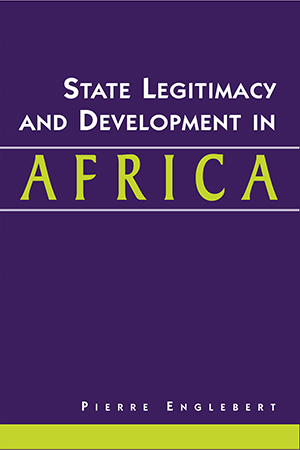Now Available in Paperback!
Although it typically is taken for granted that African economies perform poorly, it is less well known that there are a small but significant number of success stories on the continent. What accounts for Africa's average stagnation, and for the wide regional variations in developmental fortunes? Englebert argues with compelling statistics and the liberal use of examples that differences in economic performance both in Africa and across the developing world can be linked to differences in historical state legitimacy.
Showing how the arbitrary nature of postcolonial African states conditions the type of policies that African elites adopt, Englebert establishes the impact of imported government institutions on government performance. His analysis calls into question the relevance of both structural adjustment and public-sector reform programs, pointing to institutional and territorial restructuring as prerequisites for sustainable African development.
Pierre Englebert is H. Russell Smith Professor of International Relations at Pomona College, as well as senior fellow at the Atlantic Council's Africa Center.
"This book's combination of rigorous analysis and clear prose make it a wonderful addition to the present literature on African affairs."—Brendan McSherry, African Studies Quarterly
"Pierre Englebert asks a very relevant question that sets the tone for this brilliant work: Is there anything ‘African' in an African state that makes it inimical to economic growth and proper governance?... This work strikes at the heart of Africa's crisis of economic stagnation and underdevelopment.... It is a must read for all Africans who seek a better continent, for students of African politics, decision-makers, and development specialists of all genres."—Osaore Aideyan, African Studies Review
"Englebert's book is a veritable how-to guide in hypothesis testing and empirical work in comparative politics."—John Quinn, International Politics
"Well-informed, theoretically and methodologically sophisticated, and highly innovative.... This book will have a lasting and positive influence on African and development studies, and it would be excellent assigned reading for upper division and graduate courses."—James R. Scarritt, American Political Science Review
"A provocative attempt to analyze the relationship between the political legitimacy of states and economic growth in Africa."—Fumihiko Saito, Development Policy Review
"This excellently written book examines the extent to which colonial experience affects the policy choices and economic growth of countries in the African region.... Students and scholars of African development should find this book very helpful. Recommended for informed general readers and upper-division undergraduate and graduate students, faculty, researchers, and professionals."—Choice
"Few authors are able to cross the disciplinary lines between politics and economics as gracefully as Pierre Englebert does. He applies his comprehensive analytical framework to the puzzle of Africa's growth tragedy, addresses the core problem of weak state legitimacy, and makes bold recommendations for fundamental change. This book is a gem for academics and practitioners alike."—Carol Graham






